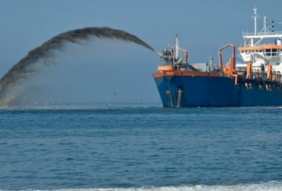
Posted on November 13, 2015
The Berth 9 Extension at the Port of Felixstowe, the Port of Britain, has been opened by Dr Therese Coffey MP, Deputy Leader of the House of Commons.
The 190m extension increases the port’s capability to work two of the world’s largest containerships simultaneously. More than eighty ships of 18,000+TEU have already been handled at the port in 2015, confirming Felixstowe’s position as the port-of-choice for mega-ships in the UK.
Speaking at the ceremony, Dr Coffey said: “I am delighted to formally open this latest extension of the Port of Felixstowe. An ever increasing proportion of UK trade is moving on these huge container ships and UK ports need to provide the facilities they require. Felixstowe was the first port in the UK to handle these vessels and this latest development will help ensure UK exports reach overseas markets in the most efficient way possible.”
Clemence Cheng, Chief Executive Officer of the Port of Felixstowe and Managing Director of HPH Europe division, added: “The Berth 9 Extension represents the latest phase of development at the Port of Felixstowe. Our programme of continued investment has ensured that the UK remains a destination for direct calls by the latest generation of mega-ships.
“We are committed to ensuring we offer the best facilities and the highest possible levels of service and productivity to all our customers. The new facilities being opened today will help us deliver on this commitment and ensure that the Port of Felixstowe remains the Port of Britain.”
Berths 8 & 9 at the port were the first in the UK to handle the latest generation of giant container ships. The quay length of the port’s newest terminal is now 920m, and the total quay length in the port nearly 4,000m.
The port has acquired three new ship-to-shore gantry cranes to work on the extended terminal. The cranes are capable of working vessels with containers stacked 10-high, and 24-wide, on deck. There are now 10 cranes on Berths 8 & 9 and 36 in the port as a whole.
The Port of Felixstowe is the largest container port in the UK, handling 44 per cent of all UK container traffic. Its importance is recognised in the Government’s National Infrastructure plan which includes improvements to its road and rail connections as leading priorities for investment.





